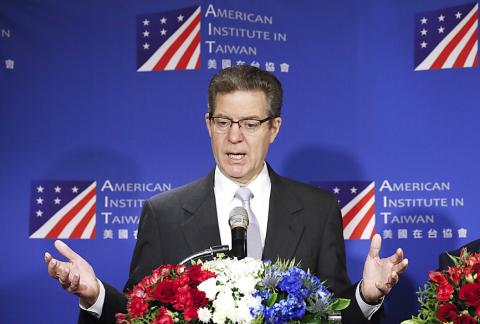Taiwan can serve as an example of religious freedom for China, US Ambassador-at-Large for International Religious Freedom Sam Brownback said in Taipei yesterday at the first regional religious freedom forum.
There is concern over crackdowns on religious freedom by Beijing, including its detention of more than 1 million Muslims, arrests of church leaders, interference with Tibetan Buddhist practices and reported torture of Falun Gong practitioners, Brownback said in a speech at the opening ceremony of the Regional Religious Freedom Forum with the theme “A Civil Society Dialogue on Securing Religious Freedom in the Indo-Pacific Region.”
With this year marking the 60th anniversary of the Dalai Lama’s exile from Tibet, Beijing should resume formal dialogue with him or his representatives immediately, Brownback said.

Photo: RITCHIE B. TONGO / EPA-EFE
The US supports the Dalai Lama’s “middle way” approach and Tibet’s meaningful autonomy, he said.
Governments and societies should collaborate to advance religious freedom, he said, adding that societies that allow religious minorities to fully participate can improve “peace, security and prosperity, like it has here in Taiwan.”
Asked at a news conference after the opening ceremony about how the US and Taiwan — the forum’s organizers — would encourage religious freedom in China, Brownback said that “holding up the example of Taiwan” would be one of the key ways to do so.
Taiwan’s religiously diverse society shows that beliefs are “not a threat to the government,” but rather “a building block for civil society,” he said, adding: “I don’t understand why in China they think it’s a threat.”
Asked how the the conference would help advance religious freedom, he said it is the first step to building an alliance of the government and individuals to oppose religious persecution.
Crackdowns on religious freedom by China are not only against the 1948 Universal Declaration of Human Rights, but also against its own constitution, he said.
While China has denied persecuting people for their religion, Brownback said Chinese authorities should answer charges and help locate missing Muslims reportedly detained in camps in Xinjiang.
“I have got lists of hundreds of names of individuals. Where are they? What is happening to them? Why can’t their families find them?” he said.
Asked to comment on whether the forum would affect the US’ relationships with Taiwan and China, he said: “I don’t know if it does or does not.”
He is in Taiwan because the nation is a good partner that believes in the same values as the US, he said, adding that Taiwan has worked closely with the US and been excellent on human rights and religious freedom.

The CIA has a message for Chinese government officials worried about their place in Chinese President Xi Jinping’s (習近平) government: Come work with us. The agency released two Mandarin-language videos on social media on Thursday inviting disgruntled officials to contact the CIA. The recruitment videos posted on YouTube and X racked up more than 5 million views combined in their first day. The outreach comes as CIA Director John Ratcliffe has vowed to boost the agency’s use of intelligence from human sources and its focus on China, which has recently targeted US officials with its own espionage operations. The videos are “aimed at

STEADFAST FRIEND: The bills encourage increased Taiwan-US engagement and address China’s distortion of UN Resolution 2758 to isolate Taiwan internationally The Presidential Office yesterday thanked the US House of Representatives for unanimously passing two Taiwan-related bills highlighting its solid support for Taiwan’s democracy and global participation, and for deepening bilateral relations. One of the bills, the Taiwan Assurance Implementation Act, requires the US Department of State to periodically review its guidelines for engagement with Taiwan, and report to the US Congress on the guidelines and plans to lift self-imposed limitations on US-Taiwan engagement. The other bill is the Taiwan International Solidarity Act, which clarifies that UN Resolution 2758 does not address the issue of the representation of Taiwan or its people in

US Indo-Pacific Commander Admiral Samuel Paparo on Friday expressed concern over the rate at which China is diversifying its military exercises, the Financial Times (FT) reported on Saturday. “The rates of change on the depth and breadth of their exercises is the one non-linear effect that I’ve seen in the last year that wakes me up at night or keeps me up at night,” Paparo was quoted by FT as saying while attending the annual Sedona Forum at the McCain Institute in Arizona. Paparo also expressed concern over the speed with which China was expanding its military. While the US

SHIFT: Taiwan’s better-than-expected first-quarter GDP and signs of weakness in the US have driven global capital back to emerging markets, the central bank head said The central bank yesterday blamed market speculation for the steep rise in the local currency, and urged exporters and financial institutions to stay calm and stop panic sell-offs to avoid hurting their own profitability. The nation’s top monetary policymaker said that it would step in, if necessary, to maintain order and stability in the foreign exchange market. The remarks came as the NT dollar yesterday closed up NT$0.919 to NT$30.145 against the US dollar in Taipei trading, after rising as high as NT$29.59 in intraday trading. The local currency has surged 5.85 percent against the greenback over the past two sessions, central